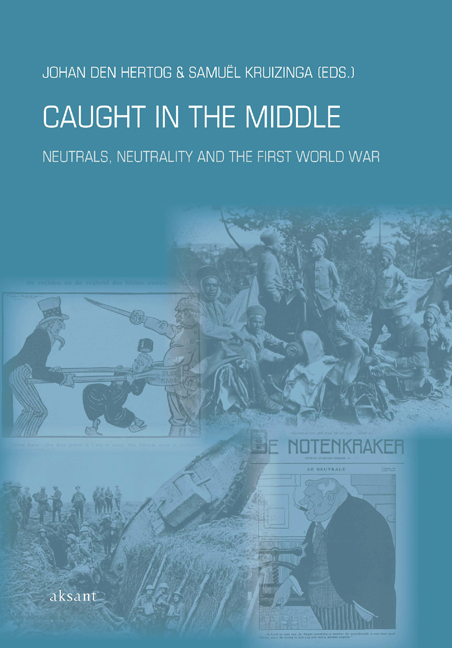Book contents
- Frontmatter
- Contents
- Acknowledgements
- Chapter 1 Introduction
- Chapter 2 Dutch Neutrality and the Value of Legal Argumentation
- Chapter 3 ‘Upon the Neutral Rests the Trusteeship of International Law’: Legal advisers and American unneutrality
- Chapter 4 Spanish Neutrality During the First World War
- Chapter 5 Britain’s Global War and Argentine Neutrality
- Chapter 6 NOT Neutrality: The Dutch government, the Netherlands Oversea Trust Company, and the Entente blockade of Germany, 1914-1918
- Chapter 7 From Parasite to Angel: Narratives of neutrality in the Swedish popular press during the First World War
- Chapter 8 Colour-blind or Clear-sighted Neutrality?: Georg Brandes and the First World War
- Chapter 9 The Hottest Places in Hell?: Finnish and Nordic neutrality from the perspective of French foreign policy, 1900-1940
- Chapter 10 The Other End of Neutrality: The First World War, the League of Nations, and Danish neutrality
- About the Contributors
Chapter 1 - Introduction
Published online by Cambridge University Press: 28 January 2021
- Frontmatter
- Contents
- Acknowledgements
- Chapter 1 Introduction
- Chapter 2 Dutch Neutrality and the Value of Legal Argumentation
- Chapter 3 ‘Upon the Neutral Rests the Trusteeship of International Law’: Legal advisers and American unneutrality
- Chapter 4 Spanish Neutrality During the First World War
- Chapter 5 Britain’s Global War and Argentine Neutrality
- Chapter 6 NOT Neutrality: The Dutch government, the Netherlands Oversea Trust Company, and the Entente blockade of Germany, 1914-1918
- Chapter 7 From Parasite to Angel: Narratives of neutrality in the Swedish popular press during the First World War
- Chapter 8 Colour-blind or Clear-sighted Neutrality?: Georg Brandes and the First World War
- Chapter 9 The Hottest Places in Hell?: Finnish and Nordic neutrality from the perspective of French foreign policy, 1900-1940
- Chapter 10 The Other End of Neutrality: The First World War, the League of Nations, and Danish neutrality
- About the Contributors
Summary
As the [Great War] dragged on, it involved so many vital ideological principles that no compromise could be found. It developed into a deadly fight, not for a modus vivendi, but for the complete domination by the victor and the destruction of the defeated enemy. Under such conditions, neutrality became a luxury that could no longer be afforded. It had to disappear.
In 1953, Norwegian historian Nils Ørvik, cited above, published a landmark thesis on the history of neutrality through two World Wars and the beginning of the Cold War. He identified the first of these three conflicts as the ‘seminal catastrophe’ for neutrality. The First World War proved that neutrality, both as a legal concept and as foreign policy tool, had no merit; the two later wars, which were equally ‘total’ in their aims, merely provided additional evidence for his central thesis. Ørvik takes note of the fact that the concept of neutrality thus underwent a dramatic ‘decline’ from the lofty heights of nineteenth century legal internationalism to the gritty reality of great-power politics. During the First World War, the neutrals found that what they had come to believe as their rights – most importantly their right to trade with whomever they wished, but in some cases even their territorial integrity – only applied when they could force their acceptance by the belligerents. These belligerents, however, were engaged in a struggle for survival, for their way of life. As casualties on the Western, Eastern, Arab and African fronts started to mount, it seemed ever more foolish to let the letter of the law interfere with their struggle. So, both sides encroached on neutrals’ legal and sovereign rights, while at the same time warning them that any reciprocal encroachment would result in punishment, ranging from economic sanction to war.
The small neutral countries were not given much of a choice as to the maintenance of their neutrality. Squeezed, battered, and beaten from both sides, they were compelled to do what was expedient, rather than what was desirable from their own point of view. But all neutrals did not submit to the same extent. Their actual bargaining power became the decisive factor in their gradual submission to belligerent pressure. The weaker they were, the greater were their humiliations.
- Type
- Chapter
- Information
- Caught in the MiddleNeutrals, Neutrality and the First World War, pp. 1 - 14Publisher: Amsterdam University PressPrint publication year: 2012

